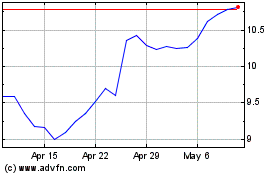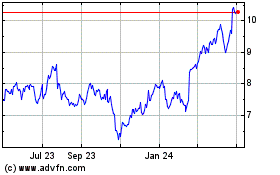Judge in Flynn Case Has Frequently Faulted the Government
December 18 2018 - 6:02PM
Dow Jones News
By Aruna Viswanatha and Brent Kendall
U.S. District Judge Emmet Sullivan, whose sharply critical
courtroom comments Tuesday toward Mike Flynn led the former
national security adviser to delay his sentencing, has in many
cases chastised the opposite side by taking the government to
task.
In a 2010 case, for example, Judge Sullivan demanded to know why
prosecutors weren't charging employees of Barclays PLC, given that
prosecutors had reached a deal for the bank itself to pay $298
million to resolve charges that it helped move money for customers
from sanctioned countries.
Judge Sullivan ultimately approved the agreement, but he
described it as a "sweetheart deal" and said the public would
wonder if Barclays was getting "a free ride." He asked prosecutors,
"You don't believe the government has put on the kid gloves
here?"
The judge may be best known for overseeing the high-profile
prosecution of former Sen. Ted Stevens, an Alaska Republican
convicted in 2008 of accepting and concealing tens of thousands of
dollars in free home renovations and other gifts.
Judge Sullivan later threw out the conviction at the Justice
Department's request when problems emerged with the way prosecutors
had shared evidence. "In 25 years on the bench I have never seen
anything approach the mishandling and misconduct I have seen in
this case," the judge said.
He appointed an investigator to examine the prosecution, and
that years-long inquiry found serious lapses in the Justice
Department's handling of the case.
Judge Sullivan's targets, however, aren't limited to the Justice
Department. In 2016, he threw several curve balls at the Federal
Trade Commission, rattling the agency's lawyers as they challenged
a proposed merger of office-supply superstores Staples and Office
Depot.
The judge, nominated in 1994 by President Clinton, questioned
the FTC's handling of a witness from Amazon.com Inc. He was so hard
on the commission's lawyers that Staples and Office Depot attempted
the risky move of resting their case without a defense. The
strategy backfired, and the judge ruled for the FTC.
In 2015, Judge Sullivan threatened to hold John Koskinen, then
commissioner of the Internal Revenue Service, in contempt of court
when the agency didn't comply with an order to provide documents.
The conservative activist group Judicial Watch had sued the agency
to obtain the material under the Freedom of Information Act, saying
the IRS had targeted conservative nonprofit groups as they applied
for tax-exempt status.
Threatening an agency head with contempt is rare, but Judge
Sullivan said it was merited. "In the event of noncompliance with
future court orders, the commissioner of the IRS and others shall
be directed to show cause as to why they should not be held in
contempt of court," the judge said.
His wariness of government lawyers was reflected in an op-ed he
wrote in The Wall Street Journal last year, commending New York
state courts for requiring that trial judges issue orders in
criminal proceedings notifying prosecutors of their obligations to
turn over favorable evidence to the defense, known as a Brady
order.
Judge Sullivan now issues such orders in all of his cases, as he
did when he was assigned the Flynn matter.
"My wake-up call to the importance of Brady orders came when I
presided over the deeply flawed trial of Ted Stevens," Judge
Sullivan wrote in the opinion piece, adding that "judges have a
responsibility to take action against unethical prosecutors."
Write to Aruna Viswanatha at Aruna.Viswanatha@wsj.com and Brent
Kendall at brent.kendall@wsj.com
(END) Dow Jones Newswires
December 18, 2018 17:47 ET (22:47 GMT)
Copyright (c) 2018 Dow Jones & Company, Inc.
Barclays (NYSE:BCS)
Historical Stock Chart
From Mar 2024 to Apr 2024

Barclays (NYSE:BCS)
Historical Stock Chart
From Apr 2023 to Apr 2024
